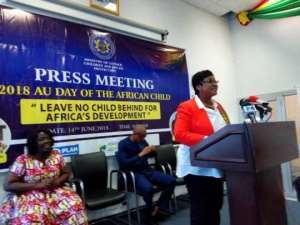
Otiko Afisah Djabah, Minister for Gender, Children and Social Protection, says Africa must invest in its children if it is to achieve Agenda 2030; the Sustainable Development Goals by mainstreaming child rights into all developmental activities.
She said it was important to ensure that children's rights took centre-stage in all programmes and policies aimed at achieving the SDGs.
She spoke at a press conference held to mark the 2018 African Union (AU) Day of the African Child in Accra on Thursday, ahead of the celebration of the Day which falls on 16 June, on the theme: 'Leave No Child Behind for Africa's Development'.
'You cannot move into the future without securing the present for the child today,' she said, adding that the overarching principle of this year's theme, which builds on the previous year's, was inclusive development for children; that children are at the centre whenever programmes and policies for implementing Agenda 2030 were developed.
She said Ghanaians, and Africans described children as the future leaders and thus had to 'put their money where their mouth was' by investing financially in the development of children and involving them in decisions that concern them.
The theme also highlights the linkages between Agenda 2030 and Children's Rights as well as the fact that the implementation of all 17 goals of Agenda 2030 was crucial to the securing child rights.
She said the SDGs were a clarion call for a more equitable future and a commitment to leave no one behind especially children, particularly the girl child.
Those left behind include children who did not have access to justice, education, health, protection, leisure and play, among others, she said, citing the incidence of children on streets in Ghana.
Ms Djaba said an important area for investment in children, which should be promoted, was the area of education, which had the potential to break inter-generational chains of poverty and give them a better life, while allowing children to make healthier choices for themselves and their families.
She called for collaboration in addressing the challenges that children faced and ensuring that their rights were safeguarded, saying while government and the ministry were taking the lead on it through various interventions, all partners including parents, teachers, media, care givers, non-governmental organisations and others must collaborate and share ideas to protect the rights of children.
Some initiatives taken by government included the formulation of laws and policies such as the Children's Act, Human Trafficking Act, Domestic Violence Act, the Child and Family Welfare Policy and the Justice for Children Policy, as well as other interventions to increase enrolment and retention in schools.
She said the Ministry had begun taking street children off the streets and into identified shelters and those of school going age would be enrolled in schools while those above will be given alternative skills training to make them productive and keep them off the streets.
This year's celebration will be marked by a durbar of children at Somanya in the Eastern Region.
The AU Day of the African Child was instituted in 1991 by the then OAU following the Soweto uprising where hundreds of school children were killed in clashes with the police when they marched to demand better educational system and facilities, during the Apartheid regime.
The Day is celebrated to create public awareness of the need for improvement of education in Africa and the realisation of children's rights in Africa.




 Former Kotoko Player George Asare elected SRC President at PUG Law Faculty
Former Kotoko Player George Asare elected SRC President at PUG Law Faculty
 2024 elections: Consider ‘dumsor’ when casting your votes; NPP deserves less — P...
2024 elections: Consider ‘dumsor’ when casting your votes; NPP deserves less — P...
 You have no grounds to call Mahama incompetent; you’ve failed — Prof. Marfo blas...
You have no grounds to call Mahama incompetent; you’ve failed — Prof. Marfo blas...
 2024 elections: NPP creates better policies for people like us; we’ll vote for B...
2024 elections: NPP creates better policies for people like us; we’ll vote for B...
 Don’t exchange your life for wealth; a sparkle of fire can be your end — Gender ...
Don’t exchange your life for wealth; a sparkle of fire can be your end — Gender ...
 Ghana’s newly installed Poland train reportedly involved in accident while on a ...
Ghana’s newly installed Poland train reportedly involved in accident while on a ...
 Chieftaincy disputes: Government imposes 4pm to 7am curfew on Sampa township
Chieftaincy disputes: Government imposes 4pm to 7am curfew on Sampa township
 Franklin Cudjoe fumes at unaccountable wasteful executive living large at the ex...
Franklin Cudjoe fumes at unaccountable wasteful executive living large at the ex...
 I'll 'stoop too low' for votes; I'm never moved by your propaganda — Oquaye Jnr ...
I'll 'stoop too low' for votes; I'm never moved by your propaganda — Oquaye Jnr ...
 Kumasi Thermal Plant commissioning: I pray God opens the eyes of leaders who don...
Kumasi Thermal Plant commissioning: I pray God opens the eyes of leaders who don...
